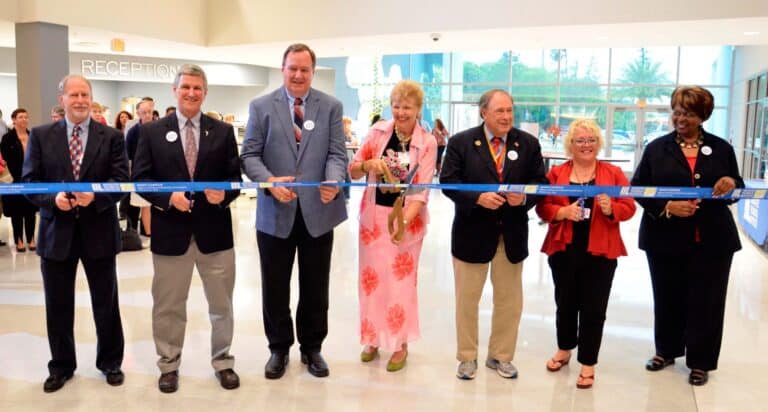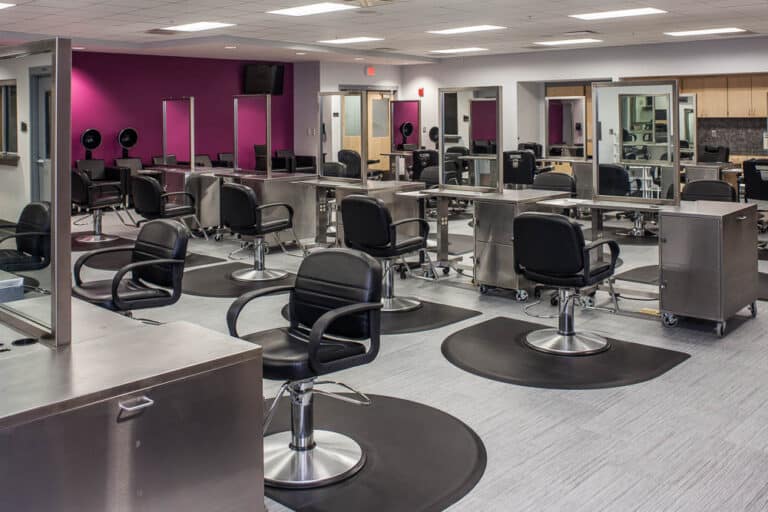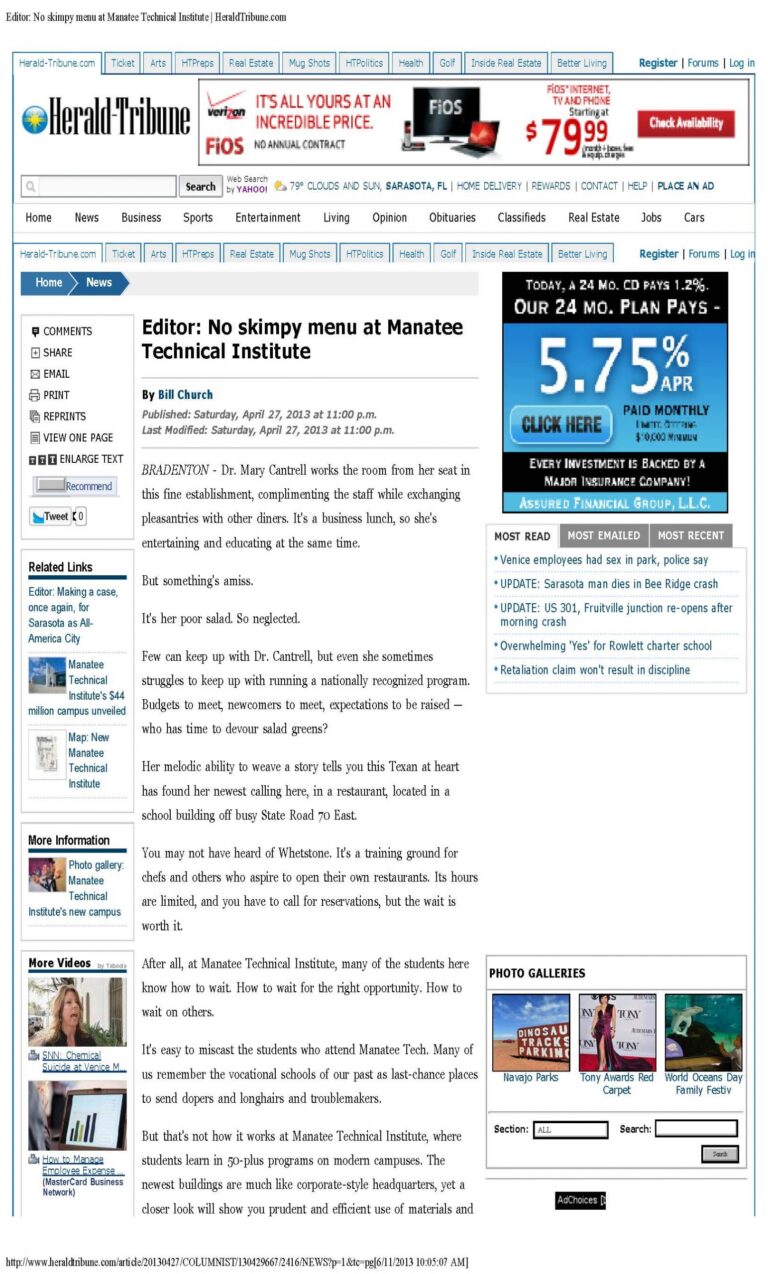NEW: Scott veto puts Displaced Homemakers Program at risk (Sarasota Herald-Tribune)
Vivian Lewis did not know where to turn.
In 1999, her marriage was on the rocks, and the homemaker without a full-time job wondered how she would make it on her own.
But through Florida’s Displaced Homemakers Program run through the Sarasota Women’s Resource Center, Lewis gained the skills to make it on her own.
“I used to be computer illiterate,” said Lewis, who found a career in caregiving. “Now, I can basically do everything, but there’s always room for learning.”
For four decades, the Displaced Homemakers Program has helped thousands of divorced and abused women and widows get the training and education necessary to handle their finances and land self-supporting jobs.
Now, a time when advocates say the program is needed more than ever, it may end because of an unexpected line-item veto by Gov. Rick Scott in the new state budget that takes effect July 1.
The veto eliminated more than $1.8 million in funding across 19 Florida counties — including Sarasota and Manatee.
The cuts have angered and bewildered program supporters because the grant had strong support in the Legislature and had operated for decades without controversy.
Scott explained the cuts by saying the services in the Displaced Homemakers Program are being offered by other state organizations.
“We’re scrambling,” said Sarasota County Women’s Resource Executive Director Janice Zarro. “The whole program is in jeopardy.”
To qualify for the program, a woman had to be older than 35, have worked in the home providing unpaid house services, be formerly dependent on another family member’s income, and be unemployed or underemployed.
Many of the women were longtime homemakers who devoted themselves to caring for their husband and children. They were without the experience to manage their finances or the training and guidance to find full-time work.
“The program has primarily helped divorced or widowed women but it also helps domestic violence victims,” said Cynthia Stafford, D-Miami, a member of the House Appropriations Committee. “I have a grave concern because I think this does a disservice to women but also to the state of Florida. At a time we should be helping create jobs or job opportunities, I think his veto eliminates job opportunities.
“Why do you veto a program that is working?” she asked.
In his May 20 veto letter, Scott said he eliminated the funding because the program, which was created in 1976, provided services that were “duplicative” of those offered in the state’s One-Stop Career Centers, which offer employment and training services under the state Department of Economic Opportunity.
Participants in the Displaced Homemaker Program in Sarasota, Manatee and other Florida counties “may receive similar services such as career counseling, job search assistance, résumé building assistance, practice interview sessions, support services referral, specialized placement services for veterans, occupational skills training, and employer job postings at the One Stop Career Centers,” Jessica Sims, the DEO’s spokeswoman, said in a statement when asked to expand on Scott’s rationale for the veto.
But Dianne Perry, who oversees the Displaced Homemakers Program at the Manatee Technical Institute, said her program does more than just get women back to work.
Perry said the program provides emotional support and motivation to the clients as well as helping them navigate complicated application processes or even dealing with the state’s employment services at the One-Stop Centers.
“When you’re 40 years old or 45 years old or and maybe your husband has died or you just got divorced and you’re devastated and you don’t know what to do — that’s who we see,” Perry said. “We help with so much more than school. We help them kind of find their way to a good life, to find themselves again.”
She said many of those services will not be offered by the state’s One-Stop Career Centers, which are more focused on résumé writing and job searches.
Zarro with the Sarasota Women’s Resource Center echoed those concerns.
Since 1979 in Sarasota County, the program has served nearly 4,000. About 445 women locally participated in the program in the past year.
“Some of these women didn’t even know how to write a check,” Zarro said. “Now, they’re independent. They’re better people and better human beings.”
The money from the grant, which amounted to about $82,000 a year in Sarasota, helped to fund two local programs:
• The Employment and Business Success Program provides one-on-one career counseling, tips for résumé writing, job search strategies, money management, employment support groups and a career center.
• The Challenge program incorporates the vocational lessons into its 30-hour courses, but also emphasizes personal development.
Program leader Katy Yoder said the personal development section of the course helps women set goals, find a support system, gain self-confidence and learn to live independently.
“These women enter depressed and frustrated,” Yoder said. “When they leave, they’re empowered, happy and have a life plan.”
If the Women’s Resource Center cannot secure another grant before Aug. 1, Yoder said, the program will reduce its scope of services drastically, or worse.
“We’re working on getting different grants,” Yoder said. “If we’re turned down, we may not be here after July.”
The Displaced Homemakers Program at the Manatee Technical Institute may have to close its doors earlier, on July 1.
Vivian Lewis, whose life was changed by the program more than a decade ago, said it will be a big blow to women in need if the program dies.
In addition to computer skills, the Women’s Resource Center helped Lewis write a résumé, look for a job and learn to manage her money.
After several classes with the resource center, Lewis started working as a home health care provider.
Lewis said the program helped her gain something no job could give her.
“They taught me how to be more confident,” she said. “They took the time to listen to what I had to say about going back into the work force.”






